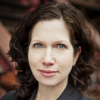Amy Waldman

Amy Waldman
Amy Waldmanis an American author and journalist. She was a reporter with the New York Times for a total of eight years. For three years she was co-chief of the South Asia bureau. Before that she covered Harlem, Brooklyn, the Bronx, and the aftermath of 9/11...
NationalityAmerican
ProfessionAuthor
CountryUnited States of America
attitude firsts steps
The rhetoric is the first step, it coarsens attitudes
bridges bats
Jealousy clings to love's underside like bats to a bridge.
home asking-why worry
Marrying Cal, the scion of a family whose wealth dated to the Industrial Revolution and had multiplied through every turn of the American economy since, ought to have eased her worries about failing to climb as high as she believed she deserved. But the money was his, not theirs. The unspoken power this gave him kept her from asking: Why don't you stay home?
secret want given
Perhaps this was the secret to being at peace: want nothing but what is given to you.
reality editing criminals
Fabricating reality was criminal; editing it, commonplace.
picks
Nothing in life gets dropped without someone else having to pick it up.
perfect decision made
There were in life rarely, if ever, "right" decisions, never perfect ones, only the best to be made under the circumstances.
religious emotional community
Religious speech is extreme, emotional, and motivational. It is anti-literal, relying on metaphor, allusion, and other rhetorical devices, and it assumes knowledge within a community of believers.
writing thinking years
I wasn't sitting around years ago thinking, 'I really want to write a novel.
character writing years
I had been a reporter for 15 years when I set out to write my first novel. I knew how to research an article or profile a subject - skills that I assumed would be useless when it came to fiction. It was from my imagination that the characters in my story would emerge.
powerful coffee writing
I found 'The Twin' sitting on a coffee table at a writers' colony in 2009. It carried praise from J.M. Coetzee. That seemed ample justification for using it to avoid my own writing. I finished it - weeping - a day later, and I've been puzzling over its powerful hold on me ever since.
thinking confusion people
Fiction just has a lot more room for ambivalence and internal conflict, contradiction, and for me that sums up so much of what people felt after 9/11 - confusion even. And I think that's hard to capture in journalism.
reality confusion coherence
As a reporter you tend to seek coherence from your subject or your source - it all needs to add up and make sense. In truth, in reality, there's often a great deal of murkiness and muddiness, confusion and contradiction.
character trying layers
As a novelist, you deepen your characters as you go, adding layers. As a reporter, you try to peel layers away: observing subjects enough to get beneath the surface, re-questioning a source to find the facts. But these processes aren't so different.